At 9, I thought it was crazy. My dad was going to squeeze Mom and all six of us kids into a boxy, top heavy, narrow Volvo station wagon, and we were going to drive for three months from our home in Paraguay to Kansas where my father grew up. This trip had been his dream since coming to Paraguay in 1951 to found and manage a Mennonite leprosy mission.
“Is there really a road that goes all the way from Paraguay to the States?” I asked.
Dad pulled out his frayed map. “It’s called the Pan-American Highway.”
The Pan-American Highway is actually not a single highway, but rather a network of roads, measuring about 48,000 kilometers, from Chile to Alaska. The road connects most of the countries of South, Central, and North Americas. According to Guinness World Records, the Pan-American Highway is the world’s longest “motorable road.” Laughable, really, in 1960. At times, it was little more than a rutted dirt road or a steep gash through treacherous mountain passes. At other times, it ended at the banks of rivers with no drivable way to get across.
On the side of the gray Volvo, Dad had painted in large black lettering “Lucha Antileprosa en el Paraguay,” (Fight Against Leprosy in Paraguay) and underneath that, “Misión Menonita.” Totally embarrassing. Everybody we met along the way would know that we came from a leprosy mission and that we were Mennonites.
***
We made it through Argentina and into Bolivia. Most of the time I was squashed between typewriter-on-her-lap Mom and my fat 11-year-old brother. My mother and her Remington documented every moment of the trip. “I think The Reader’s Digest might like to publish this,” she said. When she got to the end of a line, her arm jabbed me in the ribs as she pushed the carriage return back to the left.
Like all good Mennonites, Dad had contacted the leaders of many missions along the way before we left. I think we must have visited them all. Many of them called special church meetings in honor of our visit. My folks delivered presentations about God’s work in Paraguay, always with lots of slides. To top it all off, they lined up all six of us kids to sing Jesus Loves Me in German, English, and Spanish.
One steamy late afternoon, we entered a small village in Bolivia, slowly dodging deep ruts in the dirt road. The huts on either side were made of mud with thatched roofs and hard-packed dirt floors that one could see through the open doorways. I frowned at the children, mostly naked, who swarmed around our car. Dirty, mangy dogs, tails between their legs, lurked about. Small groups of men in undershirts and baggy pants sat around playing cards. Women walked alongside the road, eyeing us suspiciously, baskets of produce, bread, or other items on their heads.
Dad stopped the car and walked over to a group of men. “Are there any misionarios in town?
The men stared at him. One of them rose. “Sí. Algunos misionarios viven allí,” he said, pointing back to where we had come from.
We thanked him and turned back. Dad walked up to the door of a hut next to a small church and rapped on the door.
A very pregnant white woman cautiously opened the door. “Yes?” she asked politely.
“We’re missionaries from Paraguay, driving through, on our way to the States,” he said. “Can we stay for the evening meal and the night? We can sleep on your church benches,” he added, hopeful.
We sat in the car, watching, completely still.
The woman hesitated, but then the Christian spirit seemingly moved her to nod. “Of course, come on in.” Dad gestured to us and we tumbled out of the car, stinky, sweaty, and starving.
Her mouth dropped and her eyes widened. “How many are you?” she exclaimed, watching more and more of us dirty children of all ages piling out of the little Volvo.
“Meet my family,” Dad said.
We are so happy we can minister to people we meet along the way, Mom typed.
***
When we reached the Bolivian Andes, the dirt roads deteriorated into steep, treacherous, narrow spirals. It seemed like we were always on the precipice side of the road when we passed trucks or buses coming the opposite direction. All of us would lean left, into the middle of the road, trying to shift the weight of the car to keep it from tumbling off the cliffs.
As we crawled up one particularly steep pass in low gear, the Volvo ground to a stop. From where I sat, the car seemed pointed vertically up to the sky.
“You’ll all have to get out and push,” Dad said, pulling up hard on the hand brake to keep from rolling back off the cliff behind us.
We lined up behind the car and pushed. The exhaust burned our noses and stung in our eyes as the car, with our weight no longer in it, slowly coughed its way forward. Once the car began to get some traction, Dad kept driving as far as he could, and soon was out of sight. We trudged up the steep winding road behind it. Finally, after crossing a high suspension bridge that spanned two towering passes, the Volvo was in sight. Dad stood beside the car, shaking his head. “Time to push again,” he said, frowning.
This became a familiar scene as, day after day, we pushed our Volvo over the Andes.
“Why did we get this stupid car if it can’t even drive without us pushing?” I asked sourly.
We are thankful for the strength that carries us forward, Mom’s Remington recorded.
***
“It’s time to move.” Dad was always in a rush to get started before the sun was up.
We were in the mountainous Bolivian village of Totora. We had spent the night, fully dressed because it was so cold, on straw-filled sacks spread out on the concrete floor of a missionary’s warehouse.
As I sleepily dragged my sack to stack it up against the warehouse wall, I overheard my mother. “What are we going to do about our plan to go to Santa Cruz?”
“We’re going to go,” Dad said.
“But John, the pastor last night told us …” She lowered her voice. “John, because of the elections, there are likely to be bandits in that part of the country.”
Suddenly wide-awake, I asked, “Bandits? Where?”
“Never mind.” Dad glared at me. “Now come on, let’s get moving.”
My father leaned forward in his seat, eyes focused on the narrow dirt road in front of us, his white knuckles gripping the steering wheel. Whenever Dad looked like that, we didn’t mess around. We all sat tense and quiet, forgetting our usual bickering about who was invading whose space.
After several hours, we approached the town of Alquile. Dad stopped the car at an outdoor market.
“Stay in the car. I’m going to buy us some oranges for breakfast,” he said. We all watched as he spoke, mostly in gestures, to a stout Quechua woman who wore an apron over her long dark skirt and many underskirts, a dusty bowler hat perched high on her head.
We left the village with our oranges and slowly made our way up the winding dirt road until we spotted a mountain stream. Dad pulled over and carefully scanned the area ahead and behind us.
“We’ll be OK here,” he said. “Let’s have a drink and fill our thermoses with water from this stream.”
I scampered up behind the streambed with my brothers to explore the woods above it. We stopped and abruptly turned when we heard men’s shouts approaching us. A dozen or so wild-looking men, wearing Basque-style berets and tattered tunics over frayed trousers, crowded around the Volvo. They yelled at Dad in Quechua, waving sawed-off shotguns at him.
“Que quieren – what do you want?” Dad asked. The men pushed him roughly aside and began to pull out the contents of our car – the food box, Mom’s Remington, pillows – throwing them to the side of the road.
I stood immobile, muscles tensed. Warm liquid trickled down the inside of my legs.
Just then an open Jeep clattered up the hill behind us, two uniformed soldiers in the front seat. The guerillas grabbed an armful of our clothing and ran up the road and off into the brush.
My knees wobbled.
Thank you, dear Lord, for your protection, the Remington chronicled.
***
We boarded a ship in Colombia, the Amerigo Vespucci, which took us through an impassable 280-kilometer stretch of marshland known as the Darién Gap and through the Panama Canal. After eight weeks and about 10,000 kilometers, we left South America and made our way into Central America.
Costa Rica was just finishing its stretch of the Pan-American Highway when we arrived, so the roads were all covered with new gravel and ready for travel.
“Pero, señor.” A friendly man at the filling station shook his head. “There are thirty-eight rivers you need to cross. There are not yet bridges across many of those rivers. The only vehicles on that road are bulldozers and trucks, all road workers,” he said. Seeing the disappointment in Dad’s eyes, he continued. “I can get the bridge ingeniero (engineer). He can tell you what you can do.”
After a few hours, the ingeniero pulled into the gas station in a large yellow diesel truck.
“Buenos dias,” he said, shaking Dad’s hand.
After hearing that Dad planned to travel across Costa Rica in the Volvo, he shook his head. “We are in the rainy season, señor. The rivers are two or three meters deep. You must go back to Panama City and take a ship to Nicaragua, skipping Costa Rica entirely.”
“But that would mean going two days back to where we came from. That’s not an option,” Dad said.
The engineer eyed the stubborn man standing in front of him, and saw the fire in his dark eyes. “Señor, I will drag you through the first river with a bulldozer, but at your own risk. And after that, you are on your own.”
“Gracias.” Dad shook his hand. There was a bounce in his walk when he approached our car.
The mud-covered bulldozer slowly made its way into the gas station and the ingeniero waved for us to follow it to the first river, just on the outskirts of the town. Its powerful tracks were nearly as high as our Volvo.
I held my breath and shrank back in the seat when we approached the river. The angry currents of the dark churning water scared me.
“Come on boys. Help get these chains attached to our front bumper. Then we’ll hook the chains onto the back of the bulldozer like this.” Dad whistled as he hooked our car up to the bulldozer.
“Dad, we’re going to drown!” I cried. Dark, angry waves smashed against the windows. I held my breath and stared at the worried creases on my father’s forehead. But instead of being swallowed beneath the swirling water, our car began to rise. I looked at my folks to see if they thought the Holy Spirit was lifting us. But no. Our Volvo floated. It bobbed up and down. The current dragged us downriver but the bulldozer steadily kept its course and pulled us to the opposite muddy shore.
Numerous other trucks, bulldozers and barges transported us safely across Costa Rica’s rivers.
***
When we finally crossed the border into the U.S. at El Paso, Texas, one day short of three months from the day we started, I vowed never again to go on such a dreadfully long trip.
The Remington reported, God has blessed us richly with this trip of a lifetime.
***
My mother never published her travel diary in The Reader’s Digest, and I have spent my entire life traveling the world.

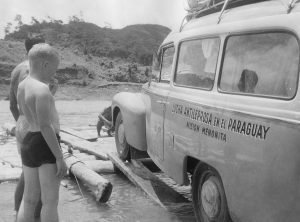
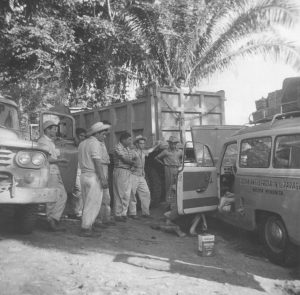
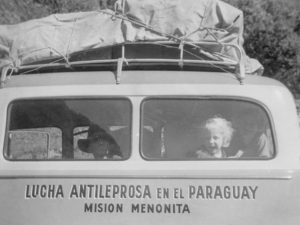
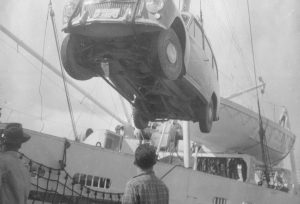

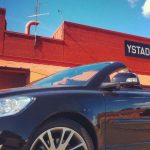
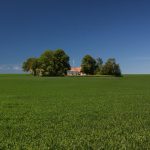

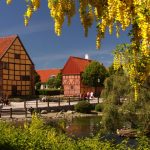
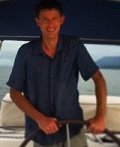
Leave a Reply